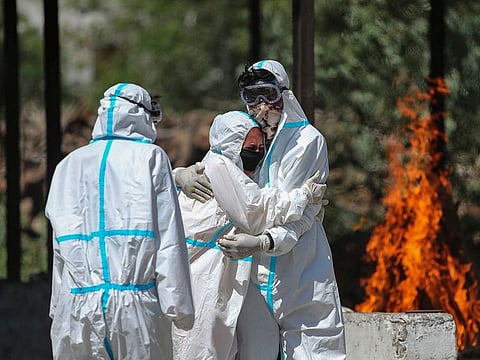COVID ‘second wave’: Madras High Court’s castigation a blot on India’s Election Commission’s legacy
Holding EC guilty of mass murder bears resonance with Allahabad HC’s 1975 ruling on Indira

Also In This Package
In the world’s largest democracy, that is India, the third pillar of the constitution — the judiciary — has time and again come to the rescue of larger public interests, castigating the political establishment and even some of the independent state institutions for failure in the discharge of their duties in keeping with the spirit of ‘maximum benefits for the maximum number’.
In that sense, the judiciary in India has played an exemplary role not only in terms of holding up a mirror before the establishment, but actually forcing the establishment and state institutions to undertake necessary measures in course correction.
Even at the risk of attracting criticism for what many may interpret as ‘judicial activism’, the Supreme Court in India and many of the state High Courts have passed landmark judgements that have further safeguarded the various constitutional guarantees provided to an average Indian citizen.
Severe criticism
However, what the Chief Justice of Madras High Court said in his judicial comments on Monday — on the abject failure of the Election Commission of India (ECI) in ensuring strict compliance with COVID-19 protocol in the conducting of elections in five states — is not just unprecedented but even path-breaking to a large extent. In the seven decades since India’s independence, scarcely has any court anywhere in the country been so severely critical of a state institution.
In his stern cautionary note addressed to the ECI, Justice Sanjib Bandyopadhyay, the Honourable Chief Justice of Madras High Court, said: “We were lulled into a false sense of security, only to be hit by this tsunami of infection now.”
Justice Bandyopadhyay made these comments in concluding a day-long hearing into a suo moto case taken up by the Madras High Court to monitor the measures adopted by the Tamil Nadu government to deal with the ‘second wave’ of the coronavirus pandemic.
The bench, also comprising Honourable Justice Senthil Ramamoorthy, was scathing in its criticism of the role played by the ECI in conducting the recent state elections, saying that it is the ECI and ECI alone that is responsible for the ‘second wave’ of COVID-19 wreaking such havoc in India.
The division bench categorically stated that murder cases should be filed against the ECI for failing to ensure compliance with COVID protocol, that has led to such a sharp rise in deaths in the country. The bench even threatened to withhold counting of votes on May 2 if ECI didn’t strictly enforce COVID protocol.
Failing to rise to the challenge
Such castigation, that too of the supreme electoral regulatory authority in the world’s largest democracy, is a blot on the ECI’s legacy as an independent and responsible constitutional entity.
Holding elections in the midst of a pandemic came with its own share of challenges and the ECI ought to have stepped up to the plate, given the range of powers at its disposal. Even after the fifth phase of polling was over in West Bengal earlier this month, the ECI had the option to club the remaining three phases into a single phase.
Yet, it insisted on going ahead with the schedule — unchanged. While the model code of conduct (MCC) stipulated the maximum number of vehicles to only five for each rally, political parties were seen unleashing a cavalcade of cars in their campaigns, caring two hoots for COVID safety.
And the EC played a mute spectator to such gross violations.
Just two weeks ago, the Calcutta High Court division bench comprising Honourable Justice T.B.A. Radhakrishnan and Honourable Justice Arijit Bandyopadhyay had made similar observations about the ECI, saying that the ECI must realise that its responsibilities do not end merely by issuing statutes and strictures, but it’s incumbent upon the electoral authority to ensure execution of those strictures in right earnest.
The Calcutta High Court division bench had even alluded to the stringent measures adopted by former chief election commissioner of India, late T.N. Seshan, in preventing electoral malpractices and enforcing large-scale electoral reforms in India.
The Calcutta High Court’s division bench said that if required, it would “assume the role of T.N. Seshan” to enforce health and safety protocol during electioneering. There were similar observations made by the Delhi High Court and also the Supreme Court of India over the ECI’s inability to enforce COVID safety measure as part of the ‘model code of conduct’.
Guilty of mass murder
However, no court in India has ever been as critical and harsh in its comments on any state institution in the country as the Madras High Court has been about the ECI, effectively holding the electoral body guilty of mass murder! Such castigation has only one other precedence when, on June 12, 1975, the Allahabad High Court ruled the then Congress leader and prime minister Indira Gandhi’s 1971 election victory as null and void.
The single-judge bench of Allahabad High Court, comprising Justice Jagamohanlal Sinha, found Indira guilty of electoral malpractice and barred her from contesting elections for the next six years. According to many political observers, it was this very verdict that prompted Indira to declare a National Emergency on June 25, 1975, in order to prolong her hold on power in the most draconian way possible.
The Allahabad High Court judgement was a major blow to the ECI’s integrity as an independent body. The April 26, 2021, Madras High Court comments on the ECI are a stark reminder of that verdict and probably much more embarrassing for a state institution of the ECI’s stature.
Twitter: @moumiayush








